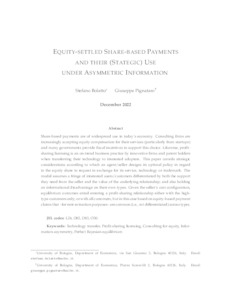Bolatto, Stefano ; Pignataro, Giuseppe
(2023)
Equity-settled share-based payments and their (stategic) use under asymmetric information.
[Preprint]
Full text disponibile come:
![[thumbnail of Working paper]](https://amsacta.unibo.it/7306/1.hassmallThumbnailVersion/Bolatto_Pignataro_JPET_rev1.pdf)  Anteprima |
Documento di testo(pdf) (Working paper)
Licenza: Salvo eventuali più ampie autorizzazioni dell'autore, il contributo può essere liberamente consultato e può essere effettuato il salvataggio e la stampa di una copia per fini strettamente personali di studio, di ricerca e di insegnamento, con espresso divieto di qualunque utilizzo direttamente o indirettamente commerciale. Ogni altro diritto sul materiale è riservato.
Download (314kB)
| Anteprima
|
Abstract
Share-based payments are of widespread use in today’s economy. Consulting firms are increasingly accepting equity compensation for their services (particularly from startups)
and many governments provide fiscal incentives to support this choice. Likewise, profitsharing licensing is an on-trend business practice by innovative firms and patent holders when transferring their technology to interested adopters. This paper unveils strategic considerations according to which an agent/seller designs its optimal policy in regard to the equity share to request in exchange for its service, technology or trademark. The model assumes a fringe of interested users/customers differentiated by both the support they need from the seller and the value of the underlying relationship; and also holding an informational disadvantage on their own types. Given the seller’s cost configuration, equilibrium outcomes entail entering a profit-sharing relationship either with the hightype customers only; or with all customers, but in this case based on equity-based payment claims that –for rent extraction purposes– are common (i.e., not differentiated) across types.
Abstract
Share-based payments are of widespread use in today’s economy. Consulting firms are increasingly accepting equity compensation for their services (particularly from startups)
and many governments provide fiscal incentives to support this choice. Likewise, profitsharing licensing is an on-trend business practice by innovative firms and patent holders when transferring their technology to interested adopters. This paper unveils strategic considerations according to which an agent/seller designs its optimal policy in regard to the equity share to request in exchange for its service, technology or trademark. The model assumes a fringe of interested users/customers differentiated by both the support they need from the seller and the value of the underlying relationship; and also holding an informational disadvantage on their own types. Given the seller’s cost configuration, equilibrium outcomes entail entering a profit-sharing relationship either with the hightype customers only; or with all customers, but in this case based on equity-based payment claims that –for rent extraction purposes– are common (i.e., not differentiated) across types.
Tipologia del documento
Preprint
Autori
Parole chiave
Technology transfer, Profit-sharing licensing, Consulting for equity, Information asymmetry, Perfect Bayesian equilibrium
Settori scientifico-disciplinari
DOI
Data di deposito
08 Giu 2023 10:49
Ultima modifica
08 Giu 2023 10:49
URI
Altri metadati
Tipologia del documento
Preprint
Autori
Parole chiave
Technology transfer, Profit-sharing licensing, Consulting for equity, Information asymmetry, Perfect Bayesian equilibrium
Settori scientifico-disciplinari
DOI
Data di deposito
08 Giu 2023 10:49
Ultima modifica
08 Giu 2023 10:49
URI
Statistica sui download
Statistica sui download
Gestione del documento:



 Login per gli autori
Login per gli autori



